SML0382
KU 0063794
≥98% (HPLC)
Sinónimos:
rel-5-[2-[(2R,6S)-2,6-Dimethyl-4-morpholinyl]-4-(4-morp holinyl)pyrido[2,3-d]pyrimidin-7-yl]-2-methoxybenzenemethanol
About This Item
Productos recomendados
Quality Level
assay
≥98% (HPLC)
form
powder
color
white to beige
solubility
DMSO: >2 mg/mL (warmed)
storage temp.
2-8°C
SMILES string
COc1ccc(cc1CO)-c2ccc3c(nc(nc3n2)N4C[C@H](C)O[C@H](C)C4)N5CCOCC5
InChI
1S/C25H31N5O4/c1-16-13-30(14-17(2)34-16)25-27-23-20(24(28-25)29-8-10-33-11-9-29)5-6-21(26-23)18-4-7-22(32-3)19(12-18)15-31/h4-7,12,16-17,31H,8-11,13-15H2,1-3H3/t16-,17+
InChI key
RFSMUFRPPYDYRD-CALCHBBNSA-N
Application
- as a mammalian target of rapamycin (mTOR) inhibitor to study the effects of follicular stimulating hormone (FSH) in mTOR phosphorylation and vascular cell adhesion molecule-1 (VCAM-1) expression in human umbilical vascular endothelial cells (HUVECs)
- as a mTOR inhibitor to treat effector memory (EM) CD8+ T cells for metabolic flux analysis
- as an autophagy inducer to demonstrate the utility of p62 and LC3B-II quantification in HEK293T cells and primary cultures of rat neurons and astrocytes using time-resolved fluorescence resonance energy transfer (TR-FRET)
Biochem/physiol Actions
Features and Benefits
Storage Class
11 - Combustible Solids
wgk_germany
WGK 3
flash_point_f
Not applicable
flash_point_c
Not applicable
Certificados de análisis (COA)
Busque Certificados de análisis (COA) introduciendo el número de lote del producto. Los números de lote se encuentran en la etiqueta del producto después de las palabras «Lot» o «Batch»
¿Ya tiene este producto?
Encuentre la documentación para los productos que ha comprado recientemente en la Biblioteca de documentos.
Los clientes también vieron
Artículos
Nuestro equipo de científicos tiene experiencia en todas las áreas de investigación: Ciencias de la vida, Ciencia de los materiales, Síntesis química, Cromatografía, Analítica y muchas otras.
Póngase en contacto con el Servicio técnico









